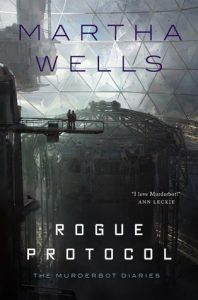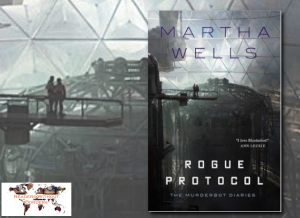Readers Without Borders – Final Update
June Readathon – #ReadersWithoutBorders

Final Update – Roque Protocol
Well, seeing as it’s July already, I suppose it’s pretty clear that the #ReadersWithoutBorders charity readathon for June is over. The readathon is the brainchild of J D Roberts at The World of SFF, and simply consists of a personal reading challenge and, for those with blogs, a blog post or two about it. The idea was to raise money for Doctors Without Borders (MSF), so please donate if you can.
My reading challenge was to read three books that are the third book in a series (#3book3s), and I’m glad to say I finished all three (the last just before midnight!). I had to play my wild card in the form of the Murderbot novella rather than a third full novel (sorry Ancillary Mercy!), but that’s why I included it in the first place.
Rogue Protocol by Martha Wells
 If you haven’t heard of the Murderbot Diaries yet, first, where have you been? And second, you are missing out. This series of Tor.com novellas (and one novel) feature a rogue SecUnit who just wants to be left alone to watch media but, because it’s a highly-capable security android, has a lot of hurdles to overcome first. There’s an overarching plot regarding Murderbot’s escape from corporate control, but each novella stands alone pretty well, too.
If you haven’t heard of the Murderbot Diaries yet, first, where have you been? And second, you are missing out. This series of Tor.com novellas (and one novel) feature a rogue SecUnit who just wants to be left alone to watch media but, because it’s a highly-capable security android, has a lot of hurdles to overcome first. There’s an overarching plot regarding Murderbot’s escape from corporate control, but each novella stands alone pretty well, too.
In this one, the third (obviously), we find Murderbot in pursuit of another clue to the illegal activities of her corporate nemesis. This takes it to an isolated system with an abandoned terraforming station, and, as in previous books, this entangles it with a new team of humans she initially wants nothing to do with. Of course, the operation turns out to be a lot more dangerous than anticipated, so it’s a good thing they have a highly capable android hitchhiker along for the ride.
Having a central character, and narrator, that is an AI is not a new feature for SF, but Murderbot brings a lot of charm and insight to the table. It has super-human capabilities in both combat and hacking, but has blind spots a human would not have, as well. Murderbot has an interesting perspective on the future world it lives in, but ignores some things we might, as human observers, be interested in as well. It’s also quite snarky, which is wonderful, and just wants to be left alone, which is relatable.
And Murderbot is not the only artificial intelligence in the novellas, either. In the previous book we had the powerful yet noncorporeal AI ART, along with a helpful sexbot. In this one, we have a “pet” robot with a strong attachment/relationship with one of the humans. These different facets of human-created intelligence force Murderbot to examine its own parameters, and allow the book to explore AI and humanity in a broader mirror.
In a way, the human characters are often afterthoughts in this series, because they are the ones Murderbot interacts with least. Unable to hack them or relate to them, our robot only sees them two-dimensionally, and so they appear as rather indistinct ghosts. Murderbot doesn’t care what they look like, so we aren’t told. It gives them the correct pronouns (unlike Breq in the Ancillary books), but without the context a human might fill in, these occasionally come as a minor, and irrelevant, surprise. Which isn’t to say they are cardboard – their characters are revealed by their actions, their dialogue, and by the way they treat Murderbot (and others). They just aren’t the focus.
One of the topics the series explores, almost subconsciously, is the use of pronouns. It’s not something you necessarily notice when reading (where Murderbot is “I”), but I certainly noticed when trying to write this post. I keep wanting to give Murderbot gendered pronouns, because, well, that’s what we tend to do with living things (and some non-living things, to be fair). For some reason, it feels odd referring to Murderbot as “it”, despite the fact that it is an android, definitely not human. It has a lot of personality, it has desires, and it shows compassion. This might just be its programming, but then, who is to say human biological circuitry isn’t simply a programme, too? And while I instinctively feel giving Murderbot gendered pronouns would be a compliment, I know that’s not how it would see it, and respect their choice.
Overall, Rogue Protocol is another exciting, insightful, and charming entry into a wonderful series that is deservedly popular. Martha Wells has an extensive track record of excellent SFF books to her name, and it’s great she’s finally achieving the wider success she has long deserved. Unlike my other #3book3s, this isn’t the end of the story, so I look forward to continuing in the next novella when I want a break from the chunkier stuff.
I’ve really enjoyed my readathon challenge, as it encouraged me to finish a couple series and continue another, when often my tendency is to chase the next shiny new thing. Which is what I’m going to do next, in all probability.
Thanks to J D Roberts for coming up with the idea and inviting us to participate – and don’t forget to donate!
Rogue Protocol Goodreads page.

